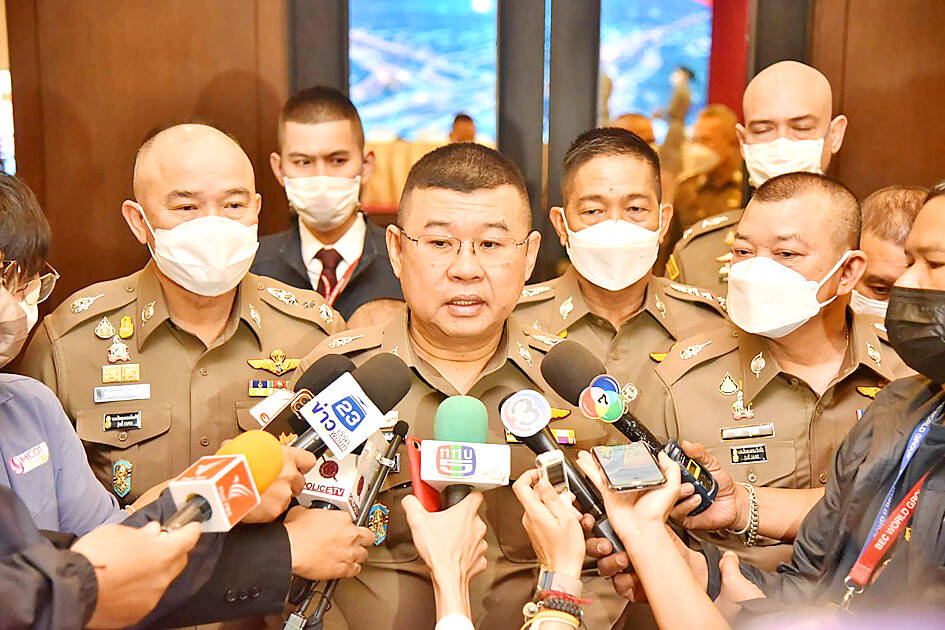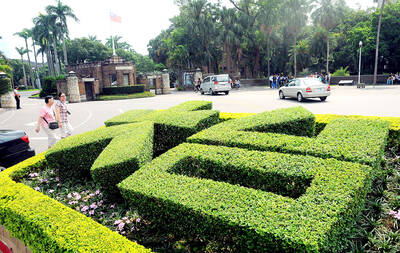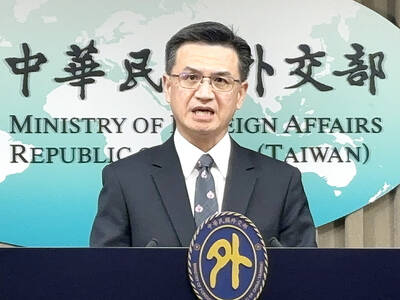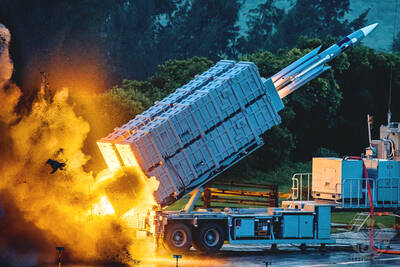Thai Police General Damrongsak Kittiprapas yesterday apologized over allegations that Thai police might have extorted money from a Taiwanese celebrity.
The apology came after Bangkok Police Chief Thiti Saengsawang on Monday said that Thai police officers might have extorted money from Taiwanese actress Charlene An (安于晴) after previously denying reports and accusations of such behavior last week.
“Witnesses are being called to confirm the wrongdoing, the amount of money given, the person who gave a bribe for the release of the tourist and the officer who took it,” Thiti was quoted as saying by the Bangkok Post.

Photo courtesy of the Royal Thai Police Office via CNA
Thiti said police helmet recordings were erased, but that forensic investigators would have to determine if they were erased manually or expired automatically.
Kittiprapas “apologized to people who were affected by the actions of police on duty at the time,” the Post reported, adding that he had instructed Thiti to ascertain the facts of the case.
Seven of 14 police officers questioned over the allegation were transferred to inactive positions pending further investigation, the Post added.
The case came to light through an Instagram Story — a temporary video that automatically deletes after a short period — posted by An last month.
In it, An said she and her friends were extorted by Thai police on Jan. 4 while on vacation.
An said her party was flagged down at a checkpoint close to the Chinese embassy in Bangkok, and Thai police officers raised several issues to hold them and prevented them from using their phones to call for assistance.
Eventually, An said, after more than an hour of quibbling, the party figured out that the police officers were actually trying to extort them down for money, and they made it clear they were not regular officers, but were “more expensive.”
An said the ordeal concluded with her party handing over 27,000 baht (US$818) in an alley that could not be seen by surveillance cameras.
An’s Instagram post later garnered the attention of the Thai and Taiwanese media, which reported on her experience and accused members of the Thai police force of committing extortion.
On Thursday last week when speaking to Thai media, Royal Thai Police Office spokesman Major General Atchayon Kraithong said upon reviewing footage from three surveillance cameras around the area, the video evidence did not support An’s accusations, dismissing wrongdoing on the part of police.
At no time did anyone from An’s group enter an alley to pay off an officer, Atchayon said, citing the video footage.
However, following that news conference, several Thai media outlets published stories saying that the officers in question had admitted to an unnamed source that they did ask An’s group for money on the night in question.
The officers apparently told the unnamed source that An’s group was found to be carrying a prohibited vaporizer and that they used the opportunity to ask for money in exchange for letting An and other members of her party go free.
Former Thai politician Chuvit Kamolvisit on Monday was quoted by the Phuket News as saying that a Thai friend of An’s Singaporean companion had a video of the payment.
He also apologized to An on Facebook, saying that he hoped “Taiwanese will forgive [the incident] and continue to visit Thailand.”

Taiwan has experienced its most significant improvement in the QS World University Rankings by Subject, data provided on Sunday by international higher education analyst Quacquarelli Symonds (QS) showed. Compared with last year’s edition of the rankings, which measure academic excellence and influence, Taiwanese universities made great improvements in the H Index metric, which evaluates research productivity and its impact, with a notable 30 percent increase overall, QS said. Taiwanese universities also made notable progress in the Citations per Paper metric, which measures the impact of research, achieving a 13 percent increase. Taiwanese universities gained 10 percent in Academic Reputation, but declined 18 percent

Chinese President Xi Jinping (習近平) yesterday met with former president Ma Ying-jeou (馬英九) at the Great Hall of the People in Beijing, with Xi’s opening statement once more emphasizing that people on both sides of the Taiwan Strait are Chinese and that foreign intervention cannot change their inevitable unification. Xi said that 5,000 years of history of zhonghua minzu (中華民族, ethnic Chinese group) have seen their ancestors move to Taiwan to establish new lives, while also documenting them fighting side-by-side against foreign forces and finally freeing Taiwan. “Both sides are Chinese,” and there are no issues that cannot be worked through, he

BULLY TACTICS: Beijing has continued its incursions into Taiwan’s airspace even as Xi Jinping talked about Taiwan being part of the Chinese family and nation China should stop its coercion of Taiwan and respect mainstream public opinion in Taiwan about sovereignty if its expression of goodwill is genuine, the Ministry of Foreign Affairs (MOFA) said yesterday. Ministry spokesman Jeff Liu (劉永健) made the comment in response to media queries about a meeting between former president Ma Ying-jeou (馬英九) and Chinese President Xi Jinping (習近平) the previous day. Ma voiced support for the so-called “1992 consensus,” while Xi said that although the two sides of the Taiwan Strait have “different systems,” this does not change the fact that they are “part of the same country,” and that “external

UNDER DISCUSSION: The combatant command would integrate fast attack boat and anti-ship missile groups to defend waters closest to the coastline, a source said The military could establish a new combatant command as early as 2026, which would be tasked with defending Taiwan’s territorial waters 24 nautical miles (44.4km) from the nation’s coastline, a source familiar with the matter said yesterday. The new command, which would fall under the Naval Command Headquarters, would be led by a vice admiral and integrate existing fast attack boat and anti-ship missile groups, along with the Naval Maritime Surveillance and Reconnaissance Command, said the source, who asked to remain anonymous. It could be launched by 2026, but details are being discussed and no final timetable has been announced, the source